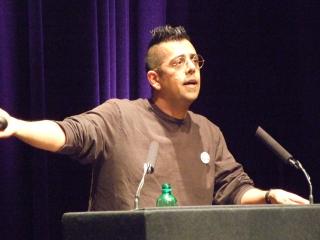You are hereBritish Chiropractic Association drops libel action against science writer after losing key issue in Appeals Court
British Chiropractic Association drops libel action against science writer after losing key issue in Appeals Court
 Simon Singh: Image credit: Gaius Cornelius (CC-A-SA)We reported previously on the libel action the British Chiropractic Association won in a lower court against esteemed British science writer Simon Singh after he called their claims that chiropractic could treat childhood diseases "bogus". The lower court had found that his statements were statements of fact, and that he therefore had to prove that the BCA knew that their claims were false when they made them. They have now abandoned their case against Singh after he won a key argument on appeal, namely that his article constituted comment and not statements of fact. (It should be noted that whether the BCA's claims about chiropractic was true was not at issue, but rather whether they knowingly made false claims.) Nevertheless, concern remains about the abuse of English libel law in matters of science and many scientists fear that several recent cases will have a chilling effect on scientific debate (see Ben Goldacre, The Guardian 15 April 2010).
Simon Singh: Image credit: Gaius Cornelius (CC-A-SA)We reported previously on the libel action the British Chiropractic Association won in a lower court against esteemed British science writer Simon Singh after he called their claims that chiropractic could treat childhood diseases "bogus". The lower court had found that his statements were statements of fact, and that he therefore had to prove that the BCA knew that their claims were false when they made them. They have now abandoned their case against Singh after he won a key argument on appeal, namely that his article constituted comment and not statements of fact. (It should be noted that whether the BCA's claims about chiropractic was true was not at issue, but rather whether they knowingly made false claims.) Nevertheless, concern remains about the abuse of English libel law in matters of science and many scientists fear that several recent cases will have a chilling effect on scientific debate (see Ben Goldacre, The Guardian 15 April 2010).
The Guardian (which published Singh's original article) reports:
The British Chiropractic Association has dropped its libel action against the science writer Simon Singh at the end of a two-year battle that has been a landmark in the libel reform campaign.
The case had become a cause celebre, with scientists, celebrities and freedom of speech campaigners lining up to condemn the British libel laws and argue that Singh had a right to express his opinion in print.
Singh was sued by the BCA for a piece he wrote in the Guardian's comment pages criticising the association for defending chiropractors who use treatments on children with conditions such as colic and asthma, when there is little evidence such treatments work.
The case has cost Singh more than £200,000 that he will never fully recover. "It still staggers me that the British Chiropractic Association and half the chiropractors in the UK were making unsubstantiated claims," he said. "It still baffles me that the BCA then dared to sue me for libel and put me through two years of hell before I was vindicated. And it still makes me angry that our libel laws not only tolerate but also encourage such ludicrous libel suits.
"English libel law is so intimidating, so expensive, so hostile to serious journalists that it has a chilling effect on all areas of debate, silencing scientists, journalists, bloggers, human rights activists and everyone else who dares to tackle serious matters of public interest.
"In the area of medicine alone, fear of libel means that good research is not always published because those with vested interests might sue, and bad research that should be withdrawn is not pulled because the authors might sue the journal, and in both cases it is the public that loses out because the truth is never exposed. My victory does not mean that our libel laws are OK, because I won despite the libel laws. We still have the most notoriously anti-free speech libel laws in the free world."
Read the full article in The Guardian.
Also read Singh's own post on The Guardian newsblog.
